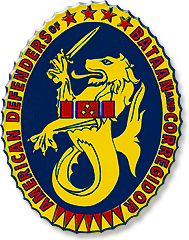
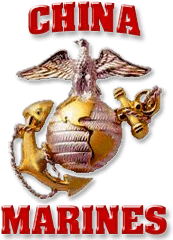
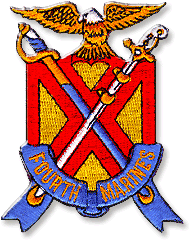
 |
 |
 |
| Fourth Marines Band: "Last China Band" |
| GUEST OF HIROHITO |
|
CHAPTER
TWO - My War |
| The excitement and confusion of battle always breeds conflicts on numbers, distances, hits and misses, the time things happened. |
|
—Walter Lord, “Incredible Victory” |
|
The fight for Hong Kong is of little interest
to historians. Other than great propaganda for the Japanese, it had little
effect on the course of the war. My memories are somewhat blurred after
almost fifty years, but I seem to have spent most of the time struggling up
and down hills, seldom knowing where we were fighting, always either being
shot at or bombed. I do remember well the company moving back to Palm Villa, and I can never forget the following day. Brigade finally ordered a counter-attack. To me it seemed a futile gesture as the Japanese had already moved into the high positions we had abandoned. The rest of the platoon were raring to go, joking over the great breakfast we had, a half a tin of cold British Army meat and vegetable stew, known as M & V. I succeeded in putting on a good front. We spent the day struggling up Notting Hill, (I am not absolutely sure this was its correct name) where the enemy were already entrenched. The terrain was rough and unfortunately absolutely unfamiliar. There was another summit that overlooked the Japanese position, and that was our objective. We crawled up on our bellies, literally hugging the ground. By now we had discarded the bright yellow fatigues that made us such great targets, and long ago had thrown away our gas masks and other useless equipment. We were already exhausted, tired and hungry, but considering the situation, still in remarkably good spirits. In a few days we had been introduced to everything the Imperial Japanese Army had to offer, and now it was going to be our turn to be on the offensive. So we hoped. Japanese rifles and machine guns had a very different sound from ours and the bullets gave a peculiar whine as they whizzed past. (We knew how ours sounded because for two hours we had been mistakenly fired on by an Indian platoon.) Fortunately, there was a good deal of cover on the hill in the uneven terrain and abundant vegetation. Scared to death, I scraped along the ground and literally ate my way up, as my face was often buried in the dirt. It is an unforgettable experience to have bullets whine over and beside your head, kicking up the dust beside you. It requires precious little imagination to contemplate the changes that a difference of one or two inches can make. Their machine guns were using some tracers in an attempt to set the grass on fire, but happily for us this did not happen. It would have been great at this stage to have had some mortar support or even better a barrage from field artillery to blast them off the hill, but this was not to be. The only good news was that for once their planes failed to show. Had they appeared on the scene our situation would have changed from being desperate to disastrous. As we circled around the first summit, the firing became continuous and I could see no way how we could ever survive. We were saved by a drainage ditch, its elevated edges hiding us from the Japanese. No one in our section was even grazed, something of a miracle, if you still believe in miracles. |
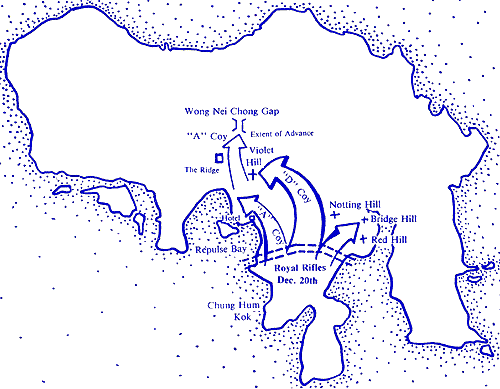 |
| Approximate lines of advance in East Brigade counter-attacks, December 20 and 21, 1941 |
|
Just as I was thinking that I might make it
through another day, a grenade thrown at the section in front of us rolled
into the depression in which I was lying, stopping at my feet. I frantically
and awkwardly kicked at it and it rolled into a hole about six feet below
me. I pushed my face into the soft dirt, terrified that this was it.... waiting for the grenade to explode. I must have huddled there for two minutes, nauseated, half paralysed with fear before I dared look up. It was a dud. Shorty Pope, the platoon sergeant, was ahead of me. He looked back and gave what I thought was an encouraging signal. Later he told me it was no such thing; he was simply telling me to take the lead out. He had not even seen the grenade. We struggled up slowly, getting well above the enemy. This was the more difficult part as the company was now much more exposed to their fire. A little mortar fire or even better some artillery support would have made this exercise much easier. None was available as not all our mortars reached Hong Kong and as I mentioned before we never had any artillery support. After what seemed like hours we reached the summit and could look down on the Japanese about fifty yards away. I thought there were about seventy-five of them, bunched together on a flat area overlooking the road. Strangely enough they were completely unaware that we Were above them and they continued firing at stragglers lower on the hill. We could see them very clearly. Their caps with the flap reaching back to cover the neck reminded me of the stories of the French Foreign Legion. They seemed so small at this distance. The officer in charge stood out as he was wearing a darker uniform and oddly enough he wore an open white shirt in contrast to the excellent camouflage of his troops. He was the first one I was to see with a sword, which he was waving about, just like in a Grade B movie. It all didn’t make any sense, as there was no one near him to slice! Perhaps he was enthusiastically encouraging his men. There were about two dozen of us, mostly Royal Rifles but also a sprinkling of Hong Kong Volunteer Defense Corps, who had made it to the crest. We had two Brens, (the standard light machine gun of that era) and since at that stage we were still all wearing the awkward standard ammunition pouches, there was a fair supply of ammo. (Some of us later discarded these pouches as they made it difficult to manoeuvre in the hills.) I was tired, sweating, anxious, and yet strangely exhilarated as I lay sprawled on the ground, aiming my Lee Enfield, waiting for Shorty Pope to give the order to commence firing. Our first burst took them completely by surprise and they scattered for shelter as our bullets raised clouds of dust. We kept firing as the survivors fled down the other side of the hill. At the time I felt no regrets about killing anyone. It never occurred to me that I might have killed an eighteen year old youth whose hopes and joy of living were the same as mine. Instead we all had what nowadays would be called a high, delighted to be alive and congratulating ourselves at having pushed the Japs off the hill. Although our section remained unscathed, the company casualties were heavy. Both our platoon commander and the company commander had been wounded. This worried us, but for the first time since the Japanese had landed I had some hope we could push them off the island. We had little ammunition left, no food and precious little water. Foolishly I had carried rum in my waterbottle, which seemed a great idea at the time, and maybe it wasn’t all that bad as it was soon drained as most everyone had a slug. Harry Simpson, who had quite recently been made a Lance-Sergeant, blew caution to the winds and let out a whoop. A young Hong Kong Volunteer Subaltern, who was by then the senior officer was exuberant... “We can beat the bastards... we’ll drive them back into the sea”. Shortly after this a corporal arrived on the scene with disappointing news. Instead of the expected rations, ammunition and reinforcements, we were to go back down the hill for a different counter-attack planned for tomorrow. I felt a deep sinking sensation in my stomach, my mouth was dry and I found myself cursing the world about me. There is little sense in my repeating the words, as none of them were either original or in those days printable. It was beginning to get dark and to add to the gloom, it began to rain. This time it was a night to remember. We groped our way in the dark, slipping and slithering into crevices, not at all sure if we were heading for Palm Villa or into a Japanese ambush. I was carrying the spare barrel for the Bren and many times was tempted to chuck it. I grumbled and cursed as we stumbled over the uneven rocky ground....and remember very vividly being admonished by Bill Barclay, “For Christ’s sake, Cambon, shut up, what the hell did you expect in the army?” I felt quite chastened, and months later in prison camp, before he died, I thanked him for getting me back on track. He was no old veteran, only a few months senior to me, but bigger and obviously more mature. Although this may be difficult for many to understand, what Bill Barclay said to me was terribly important. I had by now abandoned all hope of us coming out the winners. I knew what had happened to some of those already captured, and now was determined to try my best to go out with a bang, not a whimper. Soaked by the rain, which was now quite heavy, we reached the road, and made our way to Palm Villa, only to be welcomed by the sentry at the gate shooting at us. He really was twitchy; so much so that he did no harm, before the chaps who were manning the Vickers Gun fortunately recognized our cries. What was left of our company were quartered in the outbuildings of Palm Villa. We were cold, wet and hungry. Joe Delaney and I looked over the situation, and decided we should be able to do better than that. We went furtively into the grand old house. To our surprise, no one was there except for a wrinkled old Chinese lady who spoke no English and was obviously very afraid of us. I gave her a big smile and patted my stomach to show her I was very hungry. She scurried off and came back with some canned goods and crackers. We had a great meal of crackers and sweetened condensed milk..., something that even to this day I can consume with relish.., and sometimes a bit of nostalgia. Joe got through to her that he wanted something to drink and she came back with a bottle of whisky. I took two big slugs and was violently ill. Joe had no problems. Our new found friend must have felt really sorry for me as she scrounged up a bottle of orange soda, which I drank with some more crackers and condensed milk and felt great. A most rapid recovery. We explored the house and found several beautiful bedrooms upstairs. It was dark and ghost-like, but we could not understand why no one had moved in here. It was only later that we found out that snipers had been concentrating on the house all day. We fell on to the beds. I took off all my clothes and slid between clean white sheets. Joe did the same. What a change! For a few short hours we were the most fortunate, most contented and pampered members of the Eastern Brigade. The incredible dream ended at dawn when I awoke. It was ominously quiet. I shook Joe and we got into our still damp clothes, grabbed our rifles and dashed downstairs, expecting to get hell for leaving the platoon. To our dismay, not a soul was left; even the old Chinese lady was nowhere to be seen. We grabbed the few remaining tins of food, Joe took the half-full bottle of Scotch and we headed to the gate. Down the road a small armoured vehicle came clanking around the bend, obviously not one of ours as Eastern Brigade had none. We dove into the ditch which was really a concrete casement that ran alongside that part of the road, just in time to avoid a rain of bullets as they saw us. I thought that this is a hell of a place to die, as we ran along the ditch toward Stanley. There was no way we were going to outrace them, yet I was not nearly as scared as I had been the day before. Just as they were about to catch up with us a Vickers gun at the bend ahead opened up and stopped them dead.... literally. It was a Middlesex section manning the gun, who were covering the withdrawal of our company to Stanley, and had watched the whole performance. “Where the hell have you stupid s.o.b.s been? “is a polite rendition of what they said, the language of the British soldier in the Far East being notorious, not for using split infinitives, but managing to insert an expletive in the middle of any word that had three or more syllables. We thanked them, and Joe, in a show of magnanimity, gave them the half bottle of Scotch, before we continued cautiously, hugging the side of the road to Stanley. What was left of our platoon was near Stanley Village and they did not seem too surprised to see us. Lieutenant Smith, his arm in a sling, had returned to take charge. He was really a soldier’s soldier, and one of the many outstanding people to whom I owe my life, both during the battle and later in prison camp. I thought it was most courageous of Smitty to return to the platoon when he could have lounged in comparative comfort in the hospital. As it turned out, it saved his life, as many of the wounded patients in St. Stephen’s Hospital, where he had been, were bayoneted to death by the Japanese when they over-ran the hospital. (This is covered in detail in the Appendix.) He took one look at me, and said: “Cambon, they need someone up at regimental headquarters for the day.” I had always been the youngest one in the platoon, and had always fought against any special treatment because of my age. This time I did not object. With mixed feelings I made my way up to Stanley Fort, hitching a ride on a water truck. It was a great relief to escape from the constant harassment of the advancing enemy, but I felt guilty over leaving the remnants of the platoon. I was later to learn that shortly after I left they went up into the hills again in another counter-attack, suffering heavy casualties, but again managed to take the objective. On arrival there, I found that Stanley was another cup of tea. There was a host of British soldiers there, and I wondered if any of them had ever seen a Jap or fired a shot. I had a good feed, the first in what seemed like a year. and set out in search of battalion headquarters. It was located on the ground floor of one of the barracks that nestled against a cliff, so it was relatively secure from the mortar fire that was still fairly sporadic. Later it became a steady barrage. My job was to look after the phones. Since the only line left open was to the Brigadier and his staff, and one that worked sporadically to Headquarters, this was a rather useless endeavour. There was no longer any direct communication with Stanley village and of course nothing direct with the West Brigade. However it was interesting to me as I witnessed the antagonisms between the Canadian Commanders and the British Staff, particularly the British Brigadier. The Brigadier had been in command of the Gin Drinkers Line which was the rather facetious name for the defences in The New Territories. This had been a real snafu, a position where in my opinion, (not having been there myself) a better stand could have been made. It was abandoned with comparatively little resistance. I suspect the Japanese must have been surprised to take it so easily and have to fight so hard for the Island. This did not exactly make him a Napoleon in our eyes. Furthermore he was used to commanding colonial troops and probably considered us with the unfortunately poorly hidden superior airs so typical of the Days of the Raj. No doubt he had many skills and virtues, but they were well hidden. “A” Company was hopelessly trapped in Repulse Bay, and the rest of the battalion had had no rest, little rations and had suffered severe casualties during the past week. Lieut. Colonel Home, our Battalion Commander, wanted to give them a rest, and then undertake some well planned co-ordinated attack to join the West brigade. The Brigadier was adamant that the current futile efforts should continue, but finally agreed to have the Canadians fall back to a narrow part of the peninsula, and have a brief rest. It was good to rejoin our platoon again, when what was left of the battalion trudged up the hill to the fort. I would guess that there not much more than 300 of us left. We had some cold rations and some heavily chlorinated water. I looked in vain for Joe Delaney, only to discover he had been killed shortly after I left him. He had been a great friend to me, and I found it hard to accept. We were relieved to hear the “news” that Chiang Kai Shek’s Army was closing in on Kowloon and relief was only days away. When some different looking planes flew over, we all waved and cheered. The Japanese pilots must have thought we were bonkers as they turned to drop their bombs. Many years later I was especially interested to read in Barbara Tuchman’s biography of General Stillwell, that Chiang Kai-shek actually did announce that he was sending an army to relieve Hong Kong. Like most of the announcements of his intention to fight the Japanese, nothing ever materialized. Chiang and his wife, Madame Soong, did a great snow job on the American media, while always managing to avoid fighting the Japanese. The story of the Soong family and how they bled the United States of billions of dollars has to be a classic on how not to deal with allies. They fought a wonderful public relations war, while managing to skillfully avoid any combat. |
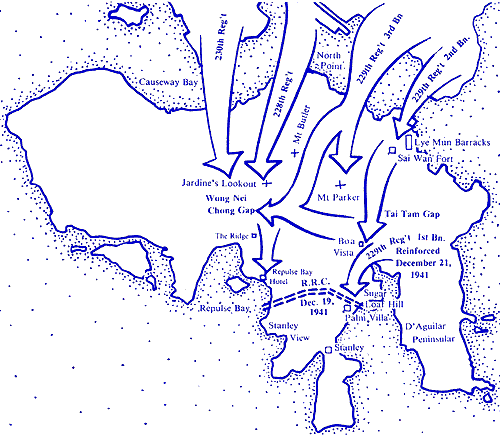 |
| Position of the Royal Rifles of Canada, December 19, 1941 after withdrawal of East Brigade and approximate lines of Japanese attack. |
|
Since then I have been immune
to rumours, and have always been skeptical of golden promises, except,
unfortunately, some of those on the Vancouver Stock Exchange. |
| Full Text of GUEST OF HIROHITO | Please Click Below for: |
| CHAPTER ONE - Before the Battle | Page 1 |
| CHAPTER TWO - My War | Page 18 |
| CHAPTER THREE - Prisoner in Hong Kong | Page 32 |
| CHAPTER FOUR - No Geishas or Cherry Blossoms | Page 54 |
| CHAPTER FIVE - Fears, Hopes and Freedom | Page 73 |
| CHAPTER SIX - Another World | Page 101 |
| CHAPTER SEVEN - Epilogue | Page 118 |
| Appendices: Excerpts from War-Crime Trials | Page 136 |
| Return to GUEST OF HIROHITO Introduction Page |
| EMAIL: info@4thmarinesband.com |
| ©2000-2021 lastchinaband.com. All rights reserved. |